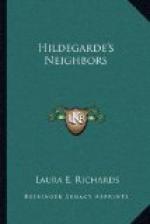Another tea-party.
It was the very day after the great affair at Roseholme that Hildegarde had her own tea-party; in fact, it had been planned for the birthday itself, and had only been postponed when Colonel Ferrers made known his kind wish. This was a piazza party. The broad, out-door room was hung with roses,—some of the very garlands which had graced the dark walls of Roseholme the night before; but here they were twined in and out of the vines which grew on all sides of the piazza, screening it from outside view, and making it truly a bower and a retreat. The guests had been asked to come at five o’clock, but it was not more than three when Hildegarde, coming to the door by chance, saw two or three little figures hanging about the gate, gazing wistfully in. At sight of her, their heads went down and their fingers went into their mouths; they studied the ground, and appeared to know neither where they were, nor why they had come.
“Euleta!” exclaimed Hildegarde; “is that you, child? and Minnie and Katie, too. Why, you are here in good time, aren’t you?”
She ran down and took the children by the hand, and led them up to the piazza. “I am very glad to see you, chicks,” she said. “Shall we take off the hats? Perhaps we will leave them on for a little,” she added, quickly, seeing a shade of distress on Euleta’s face; “they look so—gay and bright, and we might want to walk about the garden, you see.”
Euleta beamed again, and the others with her. They were sisters, and their careful mother had given them hats just alike, dreadful mysteries of magenta roses and apple-green ribbon. Their pride was pleasant to see, and Hildegarde smiled back at them, saying to herself that the dear little faces would look charming in anything, however, hideous.
Soon more children came, and yet more: Vesta Philbrook and Martha Skeat, Philena Tabb and Susan Aurora Bulger,—twelve children in all, and every child there before the stroke of four.
“Well,” said Hildegarde to herself, “the tea-table will not be quite so pretty as if I had had time to make the wreaths; but they would rather play than have wreaths, and I should not have left it till the last hour, sinner that I am.” She proposed “Little Sally Waters,” and they all fell to it with ardour.
“Oh, little Sally Waters,
sitting in the sun,
Crying, weeping, for
your young man;
Rise, Sally, rise, wipe
your weeping eyes,” etc.
Martha Skeat was the first Sally; she chose Susan Aurora, and Susan Aurora chose Hildegarde. Down went Hildegarde on the floor, and wept and wrung her hands so dramatically that the children paused in alarm, fearing that some real calamity had occurred.
“Oh! oh!” moaned Hildegarde; “my young man! Go on, children. Why are you stopping? Oh, where is my young man?” she sobbed; and the children, reassured by a twinkling smile, shrieked with delight. “What shall I do?” sobbed the girl. “I—haven’t—got—any young man! Now, children, you must say ‘Rise, Sally,’ or my foot will be sound asleep, and then I couldn’t get up at all, and what would become of your supper?”




